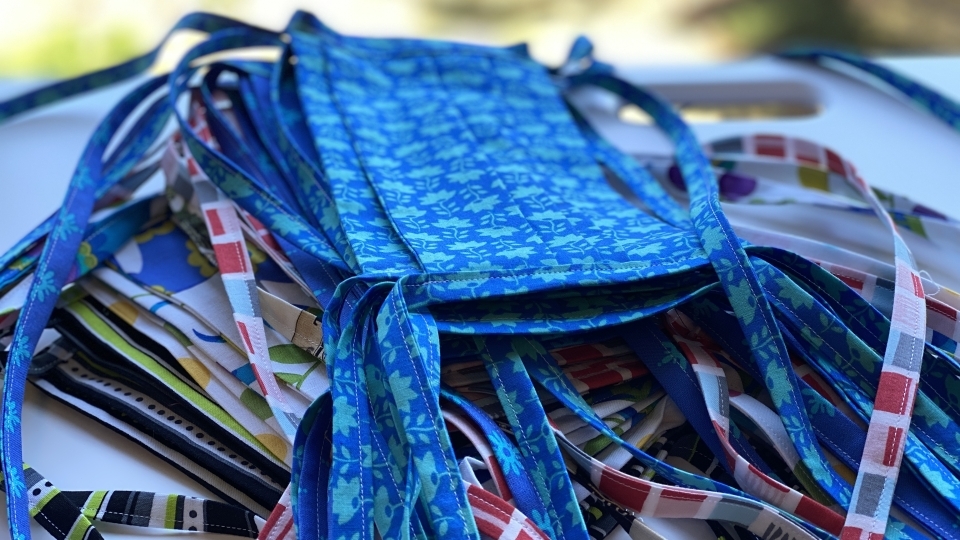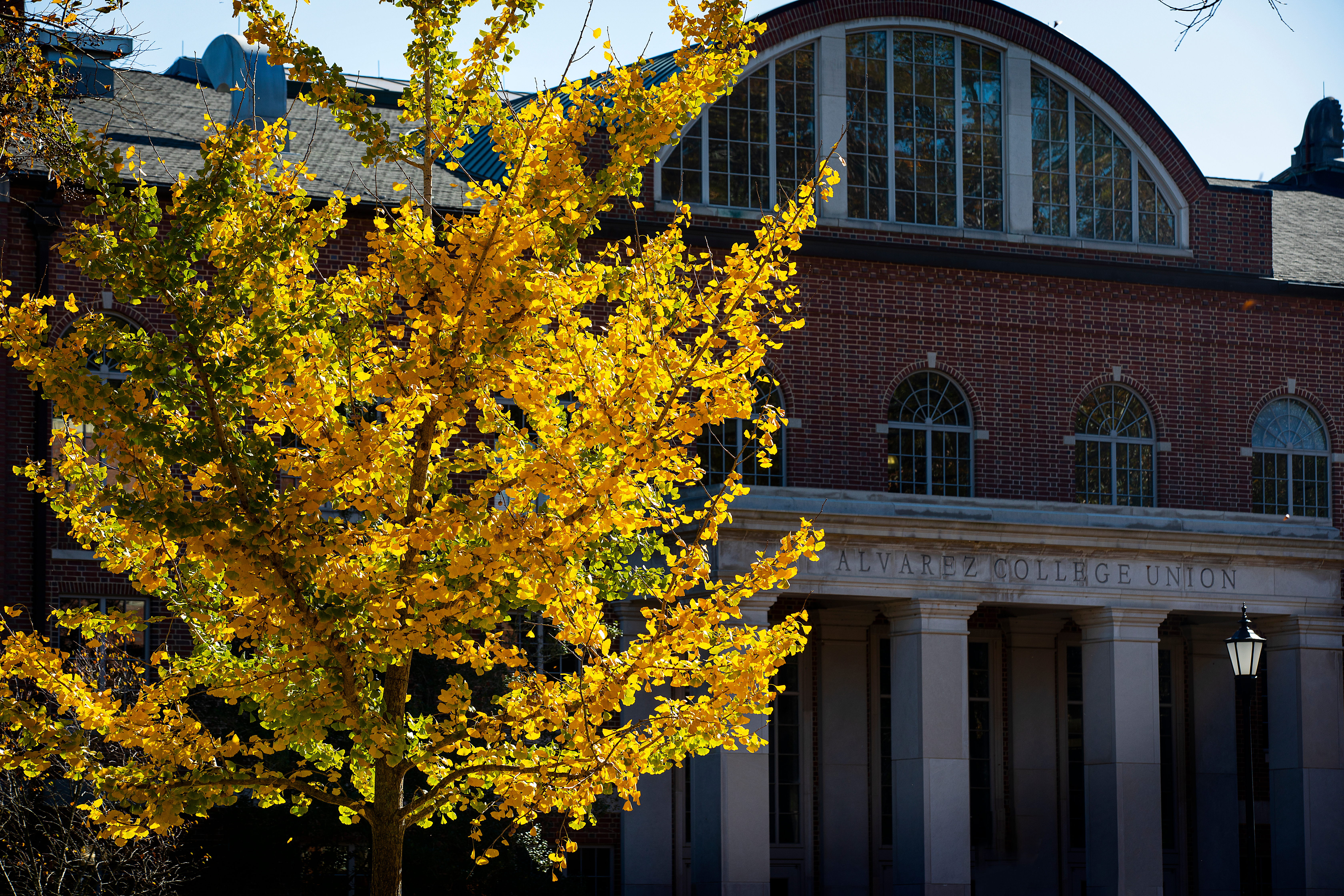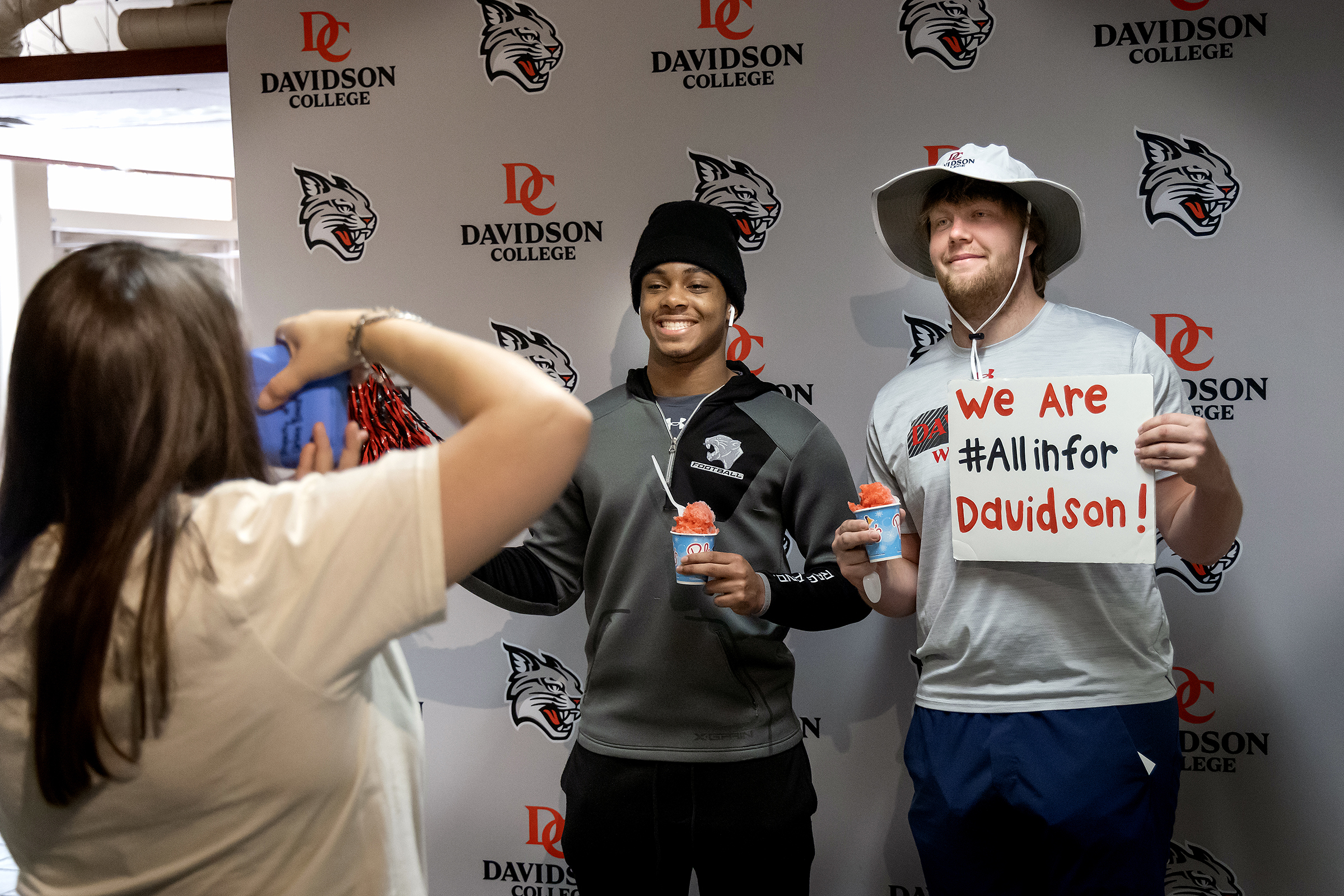Who’s Behind the Mask? Davidson Community Turns Out Protective Gear for Healthcare Workers, Loved Ones
April 10, 2020
- Author
- Danielle Strickland

Masks made by Kim Nikles '89, ready for healthcare workers at Emory University Hospital ER in Atlanta
As her mom spends long days treating Covid-19 patients in an overwhelmed New York City hospital, Emily Sirota ’20 races to make desperately needed face shields for healthcare workers.
In Charlottesville, Virginia, Kevin Hubbard ’11 and Matt Loftus ’11 produce thousands of “victory masks”—without a profit—at their clothing company, Rhoback.
Kim Nikles ’89 and her “Thread Posse” quilting group in Atlanta, Georgia, burn through their surplus of fabric, transforming attics and sewing rooms into mask-making headquarters.
Kit, a custom women’s dressmaker founded by Merin Guthrie ’06, enlists more than 70 volunteer sewers to meet hospital and fire station requests for coveted masks.
Davidson Professor of Art Cort Savage links up with a sewing group out of Ohio, professing that the art of making masks helps to mitigate the fear and anxiety caused by COVID-19.
Well before the Centers for Disease Control and Prevention’s recent recommendation to wear masks in public, the Davidson community turned its resources and energy toward meeting a national need.
Victory Masks
“We saw the writing on the wall,” Rhoback co-founder Matt Loftus said. “There was a huge shortage in hospitals, and we consulted with several friends in the medical field, including our classmate Trey Kellogg, a chief resident at UT Health in San Antonio. After our initial batch of donated masks, we decided to make them more widely available at cost.”
Healthcare workers received the first batch of 2,200 orders. Then Rhoback opened the floodgates, and things got very busy for their South Korea-based manufacturing partners.
“We couldn’t believe it,” Kevin Hubbard said. “We had nearly 15,000 orders in the first three hours. We’ve called on volunteers in the Charlottesville area to help us fulfill all the orders as they arrive.” The victory masks are on sale through Tuesday night, April 14.
Along with mask production, Rhoback started the Pick-Me-Up Polo Initiative to provide a gift of a polo shirt or pullover to nominated healthcare workers on the front lines, people who have been furloughed or laid off, or anyone significantly impacted by the situation. Hundreds of nominations flooded in.
They are also encouraging other e-commerce sites to participate in their national #Carts4Hearts campaign on April 16. Brands that run a sale on that date will match the sale percentage with a donation to charity. Rhoback’s proceeds will go to the Charlottesville Restaurant Community Fund, which helps laid off restaurant workers.
Thread Posse
In her cozy attic in Atlanta, Georgia, Kim Nikles ’89 has stepped away from her quilt-making passion to create N-95 mask fabric covers for area healthcare workers.
“My cousin is an ER nurse, and she was using one N-95 for the whole week,” said Nikles. “Putting a cover on it helps to extend its life. I’m also making the kind that people can wear for a quick run to the grocery store. Every little bit helps. My quilting group is able to share designs and patterns, and it provides a way for us to socialize, too. We are makers. It’s what we do.”
Each member of the “Thread Posse” does it differently. Some work with local Facebook groups who organize distribution, and others communicate directly with specific hospitals and caregivers.
“We’re all stuck at home, and it’s an uncertain time,” Nikles said. “So, if you can find some way to help, it gives you a small sense of control. It’s good to be able to help in a time of crisis.”
Protecting the Protecters
Davidson senior Emily Sirota has partnered with a local makerspace to use 3D printing and laser cutting to build aerosol boxes and face shields for medical professionals like her mom, a New York nurse. Sirota frequented Davidson’s makerspace, Studio M, her sophomore year, and interned at a digital fabrication startup, Wikifactory, while studying abroad last year in Madrid.
“I have a single mom working overtime as an ER nurse at Jacobi Medical Center in Bronx, NY, a level one hospital,” said Sirota. “When I got home from Davidson, I wanted to do something to help. It’s fate that this makerspace had opened up last summer, just a 10-minute walk from my home.”
New York City is the epicenter of the COVID-19 outbreak in the United States, and Sirota’s mom has said that while she is on the front lines to protect others, she also needs to protect herself. Sirota’s team donates everything directly to Jacobi.
Army of Sewers
With her team growing every day, Merin Guthrie has turned her space, previously focused on custom women’s garments for her company, Kit, into a mask-producing facility.
“We started getting requests at least two weeks ago, and I was hesitant to become involved in what I was afraid would be a giant craft project,” said Guthrie. “There wasn’t much information out there at that time, so we grabbed the best pattern we could find, and our head seamstress sewed five for us to sample.”
As the requests continued to come in, the switch flipped. On a Monday, they finished up their last custom garment, a lace top, and by Tuesday, Kit became a mask producer.
Guthrie now oversees what she calls “an army of sewers.” With one quick request on the NextDoor app, more than 70 people from her Houston neighborhood raised their hands to help. Some can only make a couple of masks per day; others churn them out at record speeds.
“We can make 250-300 masks a day, and we’ve joined a local consortium that set a combined goal of making 10,000 masks a day,” said Guthrie. “We’ve surpassed that goal, so, like any good Davidson student, I’m now trying to figure out how to do even more.”
Guthrie and her team are now exploring ways to make surgical gowns and caps and use different materials for masks, and they continue to raise money to keep production high.
“I spent five years thoughtfully and gradually scaling a women’s dressmaking company, which has a very different business plan compared to what we’re doing now. We’ve turned on a dime,” said Guthrie. “The day after the CDC said people should wear masks in public places, I woke up to text messages from every person I’ve ever met.”
Works of Art
After 20 years of face-to-face teaching, Cort Savage had to pivot abruptly, too, when his sculpture and drawing classes moved to remote learning.
In his spare time, Savage has taken on mask making using materials he has at home.
“I wanted to participate but was hesitant because there were so many different designs, and I didn’t know what was useful and what wasn’t,” Savage said. “I ended up connecting with an organization out of Ohio—it was the first site I found that was partnering with hospitals, and they had been asked to make 10,000 masks.”
Savage got to work, shipping masks to Ohio. Soon, the local requests came: Davidson College President Carol Quillen asking for masks for dining hall workers serving students still on campus; requests from neighbors, family members and friends. The purely functional masks for the hospitals turned into custom, beautiful artwork for loved ones.
“The beauty and color and pattern—it does help,” Savage said. “It can play a significant role in our ability to move through the trauma that is, of course, there.”
Savage has enough materials at his home for 2,000 masks.
“To some, this may seem a futile effort,” he said. “I read the expected need for face masks in the United States is around three billion. At the same time, I remain convinced that small efforts by many can make a profound difference.”



